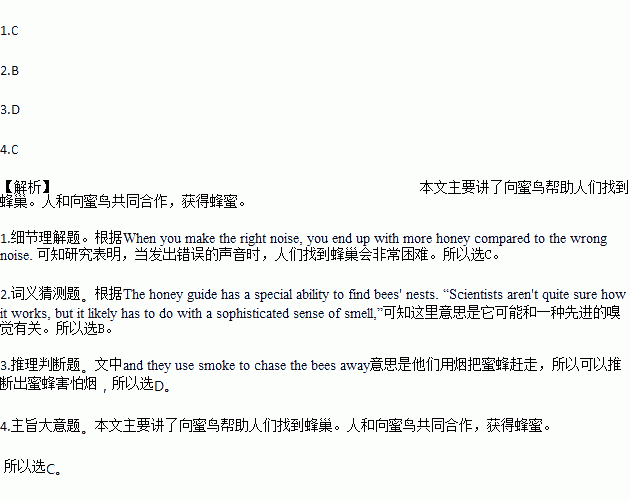题目内容
Over the centuries, through genetic and cultural adaptation, humans and a wild bird species have learned to work together .When human honey-hunters make a certain noise, a bird called the honey guide does its job with unbelievable accuracy, leading people to hidden bees' nests.
Scientists put this ancient practice to the test. When biologists compared the honey guide call to other sounds, the traditional sound sent the honey guides to hidden bees nest three times more often than other sounds, according to a study in the journal Science. When you make the right noise, you end up with more honey compared to the wrong noise.
"It's an exchange of information for skills," said study lead author Claire Spottiswoode, an evolutionary biologist at the University of Cambridge.She failed to find bees nests until her friends made the right noise,and then was rewarded with honey that's very rich and delicious.
The honey guide has a special ability to find bees' nests. “Scientists aren't quite sure how it works, but it likely has to do with a sophisticated sense of smell,” Spottiswoode said. Still, there's a problem: These nests are stuck in trees that are difficult for the birds to reach. Even worse, the bees sting the birds, sometime to death.The people of the region, who make a living on the honey, have tools that can get at those nests and they use smoke to chase the bees away, reducing the stinging problem.
It's clear that the birds have adapted in an evolutionary way through natural selection, but for people the arrangement is probably more cultural.
1.According to the study, when making the wrong noise, people probably will .
A. get more honey
B. find bees’ nests easily
C. have difficulty finding bees’ nests
D. earn more time
2.What does the underlined word “sophisticated”in the fourth paragraph probably mean?
A. elementary B. Advanced.
C. Plain. D. Poor
3.What can be learned from the text? ?
A. Scientists have found out how the honey guide works.
B. Honey guides can easily get bees' nests in trees.
C. Honey-hunters are not afraid of stinging problem.
D. The bees are afraid of smoke.
4.What can be the best title for the text?
A. The terrible relationship between humans and wild birds.
B. People in the mountains make a living on the honey.
C. The honey guide can help humans find bees’ nests
D. Human honey-hunters’ wonderful life.
假设你叫李华,最近在淘宝网上购买了一双鞋子,但出现了一些问题。
[写作内容]
请给网站写一封投诉信,包括以下内容:
1.投诉内容:
申购情况 | 实际情况 | |
颜色 | 黑色 | 白色 |
号码 | 37 | 38 |
到货日期 | 4月10日 | 4月20日 |
2.要求:重新邮寄或退款;
3.询问:若寄回,谁承担邮资?
____________________________________________________________________________________________
____________________________________________________________________________________________
____________________________________________________________________________________________
____________________________________________________________________________________________
____________________________________________________________________________________________
____________________________________________________________________________________________
____________________________________________________________________________________________
____________________________________________________________________________________________
____________________________________________________________________________

